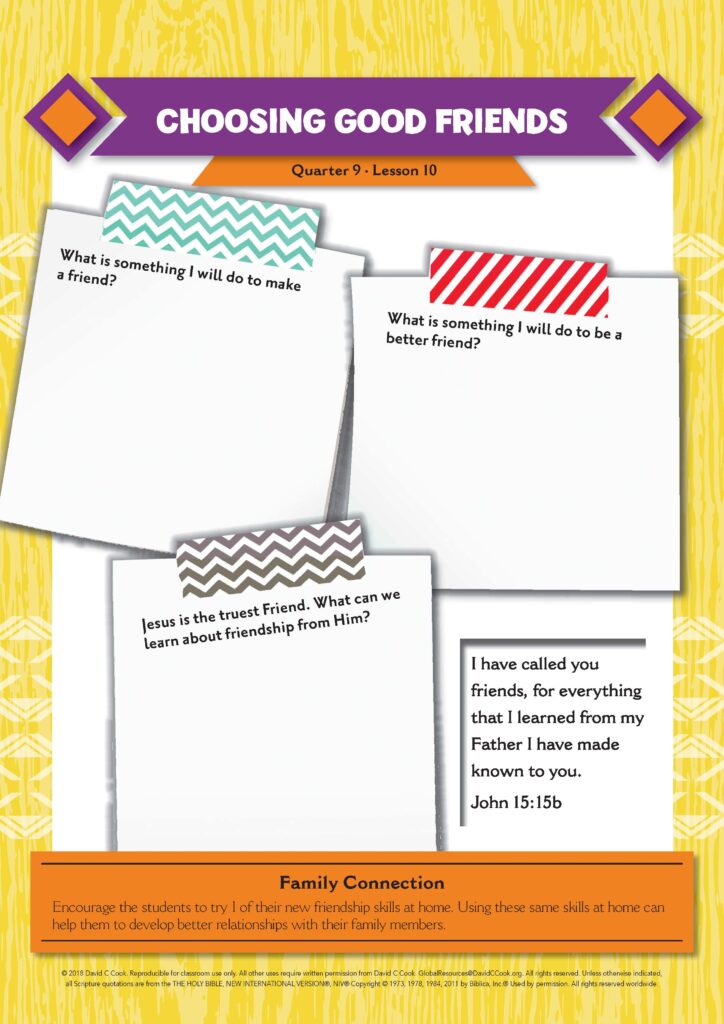During the lesson, the information for you to know is written in regular type, and what we suggest speaking or reading aloud to children is in bold. All resources for this lesson, including the Teacher Guide, Student Page, Family Connection Card, and other resources can be downloaded in a ZIP file by clicking on the following link:
In some lessons you will find "resource articles." These are articles written by experts from around the world to help equip you for your work with children and adolescents. Share them with parents or guardians if you consider it appropriate.
I have called you friends, for everything that I learned from my Father I have made known to you.
John 15:15
Encourage the students to try 1 of their new friendship skills at home. Using these same skills at home can help them to develop better relationships with their family members.
Teacher Tip: If possible, email or text the Family Connection Card to the families of your students.
Greet the students as they arrive. Ask them if they had opportunities to be good friends to others. Encourage them to greet new students and those they do not know well. Suggest that they try to find 2 things they have in common with someone else in the class. Invite 2–3 teens to share their stories with the whole group.
What are some of the characteristics of a good friend that we discussed in the last lesson?
If the students do not say these answers, remind them of the characteristics from the last lesson: faithful, caring, trustworthy, and willing to learn from each other.
One way to make friends is to share things about yourself. Being open and honest about who you are causes people to be interested in you and what you have to say. Now we will do an activity to help us learn to share about ourselves.
Divide the class into groups of 5. Have each group stand in a circle facing one another. Have the groups choose 1 student to begin the activity. The first student will say, “If you really knew me, you would know that _____________________.” The student will complete the sentence with something about him that is interesting or that others may not know. The teens will go around the circle, each sharing something interesting about himself.
When all of the students in each group have had an opportunity to share and it is the first student’s turn again, that student will say the same sentence again, but she will share something more personal or more vulnerable. The students will continue until all of the students have been able to share at least 3 things about themselves. For example, in the first round, the student might share that she likes chocolate. In the second round, she might share that she is afraid of snakes. In the third round, she might share that her brother died when she was a very young.
Did you all learn new things about each other? When we share with each other in genuine ways, we show that we are interested in the other person. We show that we trust that person to listen to and be interested in what we have to share.
Shared interests and activities are a great basis for friendship and can bring people together. Being truthful and honest about who we are helps us to know others and to be known by others. These things are the basis of a friendship. Let’s learn more about how to make friends and be good friends.
As learned in our last lesson, friendship is a gift from God. We need other people in our lives to help us, encourage us, and make us better people. That is why when it comes to making friends, we should be thoughtful and careful about whom we choose as friends.
Why do you think it is important to choose your friends wisely?
Allow 2–3 teens to share their thoughts. They may give answers such as “You spend a lot of your time with your friends, so you will be influenced by them” and “Not every person can be trusted.”
Let’s read a few verses about choosing friends wisely.
Have a student read 1 Corinthians 15:33 aloud from the Bible. If that is not possible, the verse is printed here for you.
If you are using the Memory Verse Poster, show it to the students.
Do not be misled: “Bad company corrupts good character.”
1 Corinthians 15:33

What does this verse teach us about choosing friends?
Allow 2–3 teens to share their thoughts. Then guide them to understand that spending time with people who have a negative influence on them can cause them to compromise their own values.
The friends you choose really do matter. Your friends will either influence you positively or they will influence you negatively. The right friends share your values and want you to succeed.
Also, the friends you choose can influence the way others see you. If you spend time with people who are dishonest or immoral, others will think you are the same way. But if you choose friends who make wise choices, others will believe that you are wise, too.
Let’s learn another important truth about friends from another verse in Proverbs.
A friend loves at all times, and a brother is born for a time of adversity.
Proverbs 17:17
What does this verse teach us about choosing good friends?
Allow 2–3 teens to share their thoughts. Then guide the students to understand that they should choose friends who care about them even when they are experiencing difficult circumstances.
Listen to some more advice about friendship:
A perverse person stirs up conflict, and a gossip separates close friends.
Proverbs 16:28
What does this verse teach us about choosing good friends?
Allow 2–3 teens to share their thoughts. Then guide the students to understand that they should choose friends who are honest and who do not gossip or say hurtful things about others.
People who are truthful and kind, who are trustworthy and caring, and who will have a positive influence on your life make the best kind of friends. You should look for friends who are trustworthy and loyal and who will keep their promises.
What do you think happens when you choose friends who are not good ones?
Allow 2–3 teens to share their thoughts.
When we do not choose friends wisely, we may be hurt. We may cause others to think of us in negative ways. We may be influenced to do things that we know are not right. Choosing friends wisely is important.
Now that we know what kinds of friends to choose, let’s talk about how to make friends. Making friends is a skill you will need throughout your life. The first step to making friends is to be a good friend.
For each step below, invite a few teens to come to the front of the teaching space to demonstrate. Have the volunteers listen to your explanation, and then have them demonstrate the skill.
Start with a friendly greeting. When you meet someone new or see someone you know, greet that person warmly. A warm greeting makes a person feel cared for.
Start a conversation. You do not have to say anything important or unique. You can just say something kind and honest. Ask polite questions to find things you have in common. Share genuine things about yourself so others will know you. Then listen carefully to the way the other person responds. One way to show others you care about them is to listen to and remember the things that are important to them.
Do something thoughtful or kind. An easy way to begin a friendship is to show care and concern for another person. Being a good friend is the very best way to make good friends. Even if your act of kindness does not lead to a friendship, it will make you and the other person feel good!
Pray. You can ask God for help with making friends. Ask Him for wisdom to help you recognize good friends. Ask Him to give you opportunities to build friendships with others.
God gave us friends. He also gave us the ability to communicate, to comfort people who are hurting, and to laugh with others. He created us to be good friends. We just need to use the skills He has given us. Here is another skill we can use to make friends.
Therefore encourage one another and build each other up, just as in fact you are doing.
1 Thessalonians 5:11
Another great way to make friends is to encourage others. Encouraging those around you helps to deepen your relationships.
Have the students find partners to discuss the following questions.
What is something I will do to make a friend?
Give the students 2–3 minutes to talk and brainstorm ideas for making friends. If they have trouble thinking of ideas, suggest some of the following: teaching my friend about God, listening to my friend, loving my friend unconditionally, telling my friend the truth, praying for my friend, speaking kind words to my friend, being trustworthy.
Optional: If you are using the Student Pages, the teens can do this activity on their pages.

What are some of the ideas you thought of?
Invite 4–5 teens to share their thoughts.
Now let’s practice our skills. Turn to your partner and practice the ideas you thought of.
Give the students a few minutes to practice their ideas with their partners.
Jesus is the very best kind of friend. He is always loving and encouraging, and He is always truthful with us. We can learn how to be a good friend from His example. He is with us when we feel that no one understands us. Listen to what He told His friends when He was on earth.
I have called you friends, for everything that I learned from my Father I have made known to you.
John 15:15
Jesus shared everything with us. And sharing His love with others is another great thing you can do for your friends. Friends share the most important parts of their lives with each other. When they do this, they help each other grow and stay strong when hard times come. There is nothing more important than knowing the healing and saving love of Jesus.
Close with a blessing based on 1 Thessalonians 5:11:
Blessing: May you encourage one another and build each other up in friendship as you seek to make and be good friends.
Lead the children in singing this quarter’s song, if possible.
Life on Life ©2020 David C Cook. Reproducible for home or classroom use only. All other uses require written permission from David C Cook [email protected]. All rights reserved.